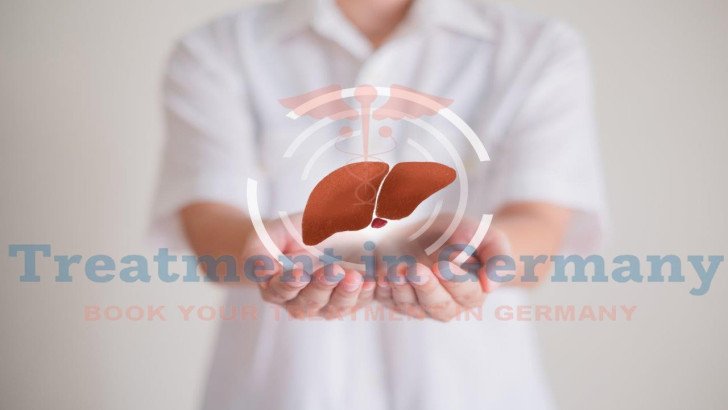
Liver cancer is a significant global health challenge, ranking among the top causes of cancer-related deaths worldwide.
Germany is a global pioneer in advanced oncology, driving liver cancer treatment into a new era with groundbreaking therapeutic innovations. In 2025, liver cancer patients benefit from precision medicine, immunotherapy advancements, interventional therapies, and AI-driven diagnostics, all designed to enhance survival outcomes and quality of life.
Liver cancer, primarily hepatocellular carcinoma (HCC), ranks as a leading cause of cancer-related mortality globally, with risk factors including chronic hepatitis B/C, cirrhosis, obesity, and alcohol-related liver disease. Cholangiocarcinoma (bile duct cancer) is another significant subtype. German oncology centers excel in delivering personalized cancer care, integrating targeted therapies, minimally invasive procedures, and clinical trials to combat disease progression and improve patient outcomes.
Early recognition of liver cancer symptoms is critical for timely treatment and improved prognosis. Common symptoms include:
These symptoms may mimic other liver conditions, necessitating diagnostic precision. German hepatologists and oncologists use advanced diagnostic tools to confirm liver cancer and guide therapeutic strategies.
Ensuring Diagnostic Precision for Liver Cancer Treatment
Diagnostic precision is the cornerstone of effective liver cancer treatment. German oncology centers employ state-of-the-art diagnostic tools:
German radiologists and geneticists ensure rapid, accurate diagnostics, enabling tailored therapeutic approaches for liver cancer patients.
Latest Advancements Redefining Liver Cancer Treatment
Germany’s therapeutic innovations in 2025 are transforming liver cancer care, offering cutting-edge solutions for early-stage and advanced disease through clinical trials and precision oncology.
Immunotherapy Breakthroughs: Harnessing Immune Power
Immunotherapy is revolutionizing liver cancer treatment by enhancing the body’s immune response:
German immunologists integrate immunotherapy with combination therapies to enhance anti-tumor efficacy.
Interventional and Radioligand Therapies: Precision Delivery
Interventional therapies and radioligand therapies offer targeted solutions for liver cancer:
German interventional radiologists enhance disease control through these therapeutic approaches.
Targeted Therapies and Molecular Inhibitors
Targeted therapies address specific genetic mutations in liver cancer:
AI-Driven Innovations in Liver Cancer Care
Artificial intelligence is transforming liver cancer treatment:
German researchers lead in AI-driven diagnostics, advancing precision oncology.
Clinical Trials Fueling Therapeutic Breakthroughs
Germany’s clinical trials drive liver cancer advancements:
Why Germany Excels in Liver Cancer Treatment
Germany offers unmatched advantages for liver cancer patients:
Transparent Treatment Protocols: Clear treatment plans empower informed decisions.
Risk Factors and Prevention Strategies for Liver Cancer
Preventing liver cancer recurrence supports therapeutic efficacy. Key risk factors include:
German specialists recommend hepatitis vaccinations, regular AFP screening, ultrasound, and lifestyle changes to reduce disease risk.
Comprehensive Multidisciplinary Cancer Care
Germany’s multidisciplinary cancer care integrates:
This approach optimizes patient outcomes.
Post-Treatment Support and Enhancing Quality of Life
Post-treatment care includes:
Challenges and Future Horizons
Challenges include tumor heterogeneity and immunotherapy resistance. German researchers address these through:
Future therapeutic breakthroughs promise enhanced clinical outcomes.
Conclusion
Germany’s latest advancements in liver cancer treatment offer hope through immunotherapy, interventional therapies, targeted therapies, and AI-driven diagnostics. With multidisciplinary cancer care and holistic support, German oncology centers achieve superior survival outcomes and quality of life, positioning Germany as a global leader in liver cancer care.
Frequently Asked Questions
What are the latest advancements in liver cancer treatment in Germany in 2025?
Germany leads with checkpoint inhibitors, dendritic cell vaccines, CAR T-cell therapy, TACE, Y90 radioembolization, and AI-driven diagnostics, significantly improving survival outcomes.
What symptoms indicate the need for liver cancer treatment?
Symptoms include abdominal discomfort, jaundice, unexplained weight loss, fatigue, ascites, and nausea, often detected through AFP screening or ultrasound.
How is eligibility for advanced liver cancer treatments determined in Germany?
Through MRI, CT, PET scans, liquid biopsies, AFP testing, and genomic profiling, ensuring diagnostic precision for personalized treatment plans.
What clinical trials are driving liver cancer treatment advancements in Germany?
Trials like HIMALAYA, LEAP-012, and CAR T-cell studies explore immunotherapy combinations, TACE, and targeted therapies for HCC and cholangiocarcinoma.
What follow-up care is provided after liver cancer treatment in Germany?
Comprehensive care includes monitoring with AFP tests and imaging, rehabilitation for nutritional deficiencies, and emotional wellness support through counseling and support groups.
How does Germany compare to the UK or US for liver cancer treatment?
Germany excels with therapeutic innovations, rapid access to clinical trials, advanced diagnostic tools, and holistic care strategies, offering superior patient outcomes.
Can these treatments prevent liver cancer recurrence?
Immunotherapy and targeted therapies reduce recurrence risk by targeting residual cancer cells and inducing immunological memory, as shown in clinical trials.
Does Germany support international liver cancer patients?
Yes, hospitals in Germany provide language assistance, travel coordination, and emotional wellness programs to ensure seamless care for global patients.
What are the most promising advancements in liver cancer treatment in Germany?
AI-driven neoantigen selection, CAR T-cell therapy, oncolytic viruses, TACE combinations, and radioligand therapies are pushing the boundaries of precision oncology.
How do Germany’s advanced treatments differ from traditional liver cancer therapies?
Unlike traditional chemotherapy or surgery, advanced treatments use precision medicine, immunotherapy, and interventional therapies for highly targeted anti-tumor efficacy, minimizing side effects.
For more information or a free consultation, visit our contact us page.
Kindly complete the form below, and our dedicated team will reach out to you promptly. We look forward to connecting with you soon!
Trierer Straße, 56072 Koblenz, Germany

.webp)
 (1).webp)

.webp)
 (1).webp)


.webp)
 (1).webp)

.webp)
 (1).webp)
